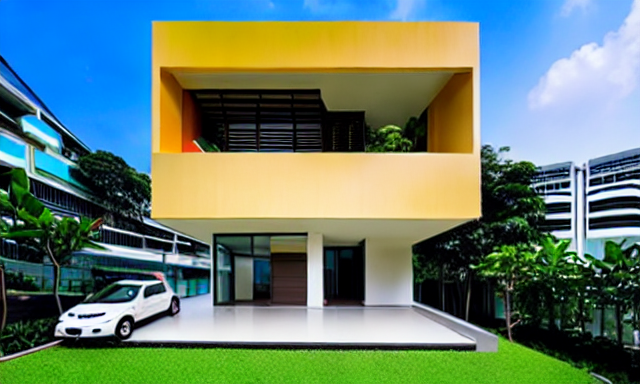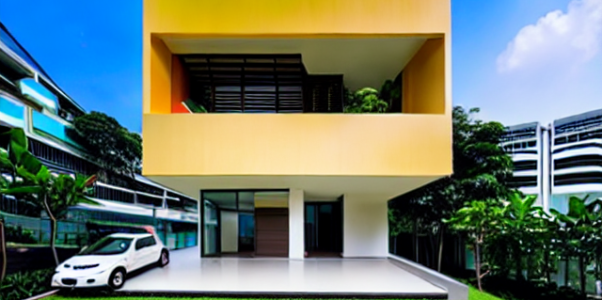Renovating a home can be both exciting and daunting, and it’s easy to make common home renovation mistakes in Singapore that can be costly and time-consuming. However, with proper planning and research, you can avoid these mistakes and ensure a successful renovation project. In this article, we will discuss nine common home renovation mistakes, provide tips to avoid them.
-
 Neglecting to Plan: A Costly Home Improvement Blunder
Neglecting to Plan: A Costly Home Improvement Blunder
A common mistake that homeowners make is neglecting to plan properly. Without a clear plan, you may end up wasting time and money on unnecessary work and materials. Research and plan each step of the renovation process, including determining the required materials, the work that needs to be done, and how long it will take. This approach can help you avoid expensive mistakes in the long run.
-
Ignoring Your Budget: Avoiding Renovation Pitfalls
Ignoring your budget is another common mistake that can lead to overspending on materials and labor. To avoid this pitfall, set a budget for your project and stick to it. Research the costs and get multiple quotes from contractors before making any decisions. This approach will help you ensure that your renovation project remains within your budget.
-
Choosing the Wrong Contractor: How to Choose the Right One
Hiring the wrong contractor is a costly mistake that can be avoided by doing proper research. Check their references, read online reviews, and ask for examples of their work. Ensure the contractor is licensed, insured and has experience working on similar projects. It’s also important to ask questions and negotiate the price to ensure that you hire the right contractor for your renovation project.
-
Skipping the Prep Work: Avoiding Subpar Results
Prep work is essential for any successful renovation project. Skipping this step can lead to subpar results and costly mistakes. Take the time to clean, sand, and prime surfaces before beginning any work. Doing this will ensure that your renovation project looks professional and lasts for years to come.
-
Choosing the Wrong Materials: How to Choose the Right Ones
Choosing the wrong materials is another common mistake that can be avoided by selecting appropriate materials that are durable and long-lasting. Avoid sacrificing quality for cost and select materials that are appropriate for your project and will withstand wear and tear over time.
-
Neglecting Safety: Prioritizing Safety in Home Renovation Projects
Neglecting safety is a common mistake that can be easily avoided by taking the necessary safety precautions, such as wearing protective gear like goggles and gloves, and following all safety guidelines. If you’re unsure about something, ask for help. Prioritizing safety can help ensure that your renovation project is successful and safe.
-
Underestimating the Time and Effort Required: Be Realistic
Renovation projects can take a lot of time and effort, and underestimating the amount of work required can lead to delays and frustration. Be realistic about the time and effort required for your project, and be prepared to make adjustments along the way. Avoid rushing the process to ensure that your renovation project is completed successfully and on time.
Underestimating the time and effort required for a home renovation project is a common mistake that can lead to delays, cost overruns, and frustration. It’s important to be realistic about the timeline and requirements for your renovation project, and to plan accordingly.
To help you better understand the time and effort required for a home renovation project in Singapore, here’s a sample timeline for a basic renovation of a 3-room HDB flat:
| Task | Duration (Days) |
|---|---|
| Site inspection | 1 |
| Design and planning | 30 |
| Obtaining necessary permits and approvals | 14 |
| Demolition and hacking | 7 |
| Electrical and plumbing work | 14 |
| Wall and ceiling plastering and painting | 14 |
| Flooring installation | 7 |
| Carpentry and built-in furniture installation | 14 |
| Cleaning and touch-ups | 7 |
| Final inspection | 1 |
| Total | 109 |
As you can see from this example, a basic renovation of a 3-room HDB flat can take around 3-4 months to complete. This timeline may vary depending on the complexity of the project, the size of the space, and other factors such as availability of materials, equipment, and manpower.
To avoid underestimating the time and effort required for your renovation project, it’s important to work with a reliable contractor who can provide you with a detailed project timeline and keep you updated on the progress. You should also factor in some buffer time for unexpected delays or issues that may arise during the renovation process.
In addition to the timeline, it’s also important to be realistic about the cost of the project. Make sure to budget for unexpected expenses and leave some room for contingencies, so that you don’t end up going over budget.
By being realistic about the time and effort required for your home renovation project, you can avoid making the mistake of underestimating these important factors and ensure a successful outcome.
-
Ignoring the Importance of Permits: Avoiding Legal Issues
Many renovation projects require permits from your local government, and ignoring this requirement can lead to costly fines and legal issues. Before beginning any project, check with your local government to determine if permits are required. If they are, make sure to obtain them before beginning any work to avoid legal issues and ensure that your renovation project is completed legally and up to code.
Ignoring the importance of permits is a common home renovation mistake that can have serious consequences. In Singapore, many renovation projects require permits from the relevant government agencies, and failing to obtain them can result in costly fines, legal issues, and even having to redo parts of the renovation.
In Singapore, the Housing and Development Board (HDB) and the Urban Redevelopment Authority (URA) are the primary agencies responsible for issuing renovation permits. The type of permit required depends on the nature and scope of the renovation project, and the rules and regulations are in place to ensure that the work is done safely and meets the necessary standards.
Common renovation projects that require permits include structural changes, such as removing or adding walls, changing the layout, or installing new fixtures like air-conditioning units. Other renovations, such as changing the flooring, installing built-in cabinets, or repainting the walls, may not require a permit, but it’s important to check with the relevant agency before starting any work.
One of the main reasons why people may ignore the importance of permits in Singapore is because they are unaware of the requirements. Some homeowners may assume that their renovation project is too small or too simple to require a permit, but this is not always the case. It’s important to do your research and check with the relevant agency to determine whether a permit is needed.
Another reason why people may ignore the importance of permits is because they want to save time and money. Obtaining a permit can add some additional steps to the renovation process, such as submitting plans and waiting for approval, which can be frustrating for some homeowners. However, the consequences of not obtaining a permit can be far more costly in the long run, including fines, legal issues, and the need to redo parts of the renovation project.
In conclusion, ignoring the importance of permits is a common home renovation mistake that homeowners in Singapore should avoid. Before starting any renovation project, it’s important to check with the relevant agency to determine whether a permit is required, and to ensure that all the necessary paperwork and approvals are in place. Taking these steps can help you avoid legal issues, costly fines, and ensure that your renovation project is completed safely and up to code.
-
Not Considering the Resale Value: Thinking Ahead
A common mistake that homeowners make during a renovation project is not considering the resale value of their home. While it’s important to make your home comfortable and functional for your current needs, it’s also important to consider how your renovation project will impact the resale value of your home in the future. Avoid making costly, personal renovations that may not appeal to future buyers, and instead, focus on improvements that add value to your home.
Home renovation projects can be exciting and rewarding, but they can also be daunting if you’re not prepared. By avoiding these common home renovation mistakes, you can ensure that your renovation project is successful, on budget, and completed in a timely manner. Remember to plan ahead, stick to your budget, choose the right contractor, prioritize safety, and consider the resale value of your home. By following these tips, you’ll be on your way to a successful home renovation project.


